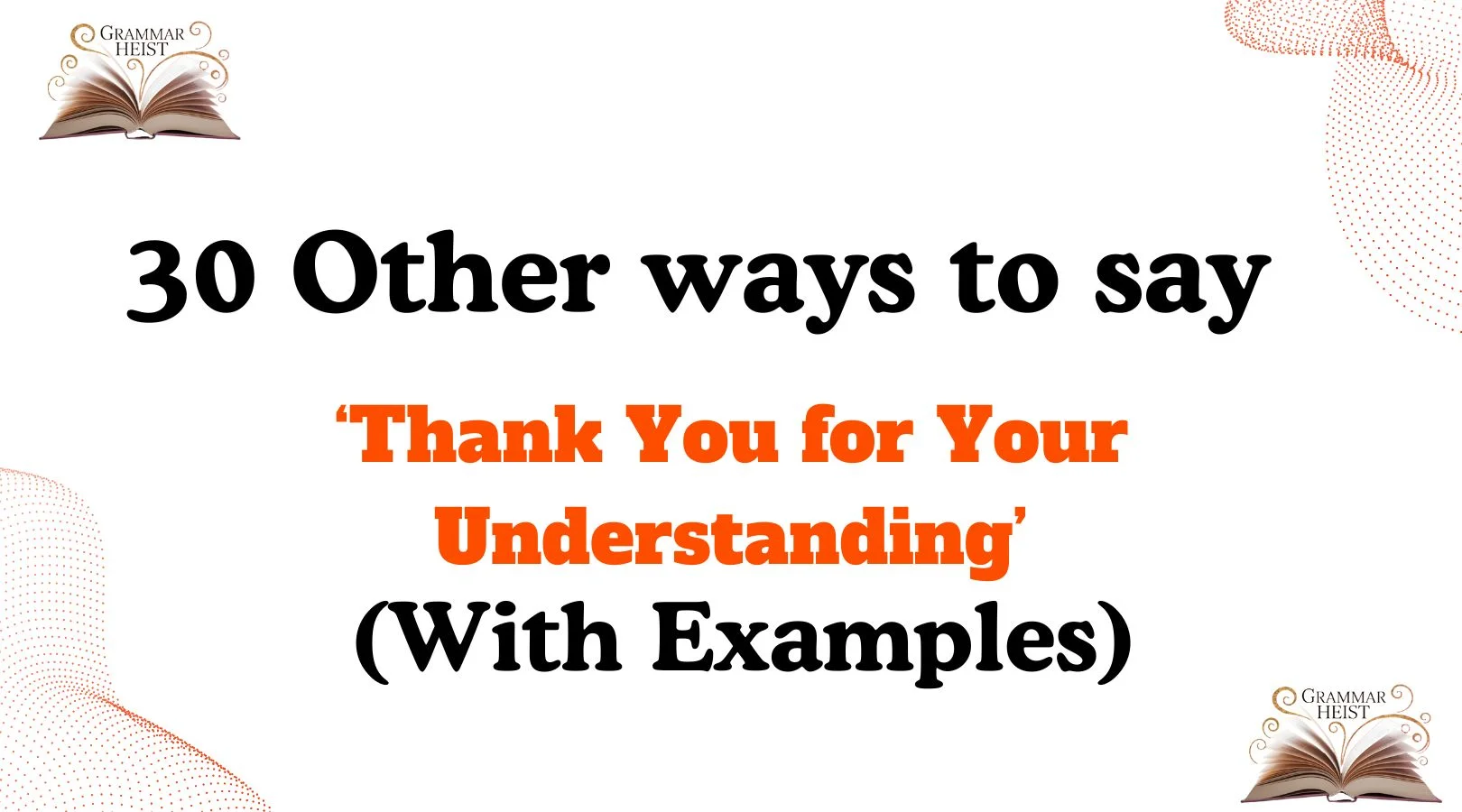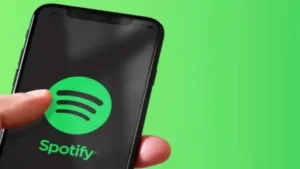Finding the right words to express appreciation isn’t always easy, especially in professional or thoughtful communication. Saying “thank you for your understanding” is a common phrase, but sometimes it can feel overused or formal. By using alternative expressions, you can make your message feel warmer, more personal, and better suited to the situation. Below, you’ll discover 30 meaningful ways to say it, with examples, tone guidance, and explanations for each.
What Does “Thank You for Your Understanding” Mean?
The phrase “thank you for your understanding” is used to show gratitude when someone accepts a situation that may be inconvenient, challenging, or delayed. It recognizes their patience, empathy, and flexibility, while softening the impact of your message.
Is It Professional/Polite to Say “Thank You for Your Understanding”?
Yes, it is both professional and polite. However, in some situations, it may sound too generic or overly formal, which is why having alternatives allows you to express the same sentiment in a way that feels more personal, caring, and empathetic.
Pros or Cons
Pros:
- Polite and respectful
- Universally understood
- Suitable for professional and personal communication
Cons:
- Can sound formal or impersonal if overused
- May feel insincere if repeated frequently
- Doesn’t always show genuine empathy
Synonyms For “Thank You for Your Understanding”
- I appreciate your patience
- Thanks for bearing with me
- I’m grateful for your flexibility
- Thank you for your patience and support
- I value your understanding
- Thanks for your cooperation
- I appreciate your support
- Thanks for giving me time
- Your patience means a lot
- I’m thankful for your understanding
- Thank you for being so understanding
- I appreciate your kindness
- Thanks for being flexible
- I’m grateful for your patience
- Thank you for working with me
- Your support means the world
- Thanks for your patience and cooperation
- I value your patience
- I’m thankful for your cooperation
- Thanks for standing by me
- I truly appreciate your patience
- Thank you for your cooperation and patience
- I’m grateful for your understanding
- Thanks for accommodating me
- I deeply value your patience
- I’m thankful for your kindness
- Thanks for your patience and help
- I appreciate your cooperation
- Thank you for being patient with me
- Your understanding is truly appreciated
1. I appreciate your patience
Scenario: When you’ve caused a delay and the other person waited kindly.
Examples:
- I appreciate your patience while I worked on resolving this issue.
- Thank you—I truly appreciate your patience during the delay.
- I appreciate your patience as I finish the final details.
Tone: Warm, appreciative, respectful.
Explanation: This phrase highlights patience directly, making the gratitude feel personal and genuine.
2. Thanks for bearing with me
Scenario: When you’ve taken longer than expected or caused inconvenience.
Examples:
- Thanks for bearing with me as I sorted everything out.
- I know it took longer than expected—thanks for bearing with me.
- Your flexibility means a lot. Thanks for bearing with me.
Tone: Casual, conversational, friendly.
Explanation: Less formal, good for colleagues or friends in relaxed communication.
3. I’m grateful for your flexibility
Scenario: When someone adjusts plans or expectations for you.
Examples:
- I’m grateful for your flexibility with the schedule change.
- Your adaptability really helped—I’m grateful for your flexibility.
- I appreciate your flexibility as we adjust this plan.
Tone: Professional, appreciative, respectful.
Explanation: Perfect for workplace or formal contexts, highlighting adaptability.
4. Thank you for your patience and support
Scenario: When someone not only waits but also supports you in the process.
Examples:
- Thank you for your patience and support during this transition.
- I deeply value your patience and support throughout the delay.
- Your patience and support mean more than words can say.
Tone: Warm, heartfelt, sincere.
Explanation: Combines gratitude with emotional acknowledgment.
5. I value your understanding
Scenario: When you want to emphasize that their understanding is important to you.
Examples:
- I value your understanding as we finalize the project details.
- Thank you—I truly value your understanding in this situation.
- Your kindness doesn’t go unnoticed. I value your understanding.
Tone: Professional, genuine, respectful.
Explanation: A direct and elegant variation.
6. Thanks for your cooperation
Scenario: When someone works with you to resolve an issue or adapt.
Examples:
- Thanks for your cooperation during the rescheduling.
- Your cooperation has been a great help—thank you.
- Thanks for your cooperation as we work through this together.
Tone: Formal, professional, collaborative.
Explanation: Best in business or teamwork contexts.
7. I appreciate your support
Scenario: When you want to highlight not just patience, but also moral or practical support.
Examples:
- I appreciate your support while I sorted this out.
- Your patience and help mean the world—I appreciate your support.
- I truly appreciate your support through this process.
Tone: Warm, supportive, encouraging.
Explanation: Great for team, client, or personal appreciation.
8. Thanks for giving me time
Scenario: When someone waits for you or extends a deadline.
Examples:
- Thanks for giving me time to review everything properly.
- I really appreciate you giving me time to catch up.
- Thanks for giving me time—it helped me do better work.
Tone: Casual, grateful, simple.
Explanation: A straightforward, informal way to express thanks.
9. Your patience means a lot
Scenario: When someone tolerates a delay or inconvenience.
Examples:
- Your patience means a lot while I handled the problem.
- Thank you—your patience means a lot to me.
- Your patience means a lot during these busy times.
Tone: Warm, sincere, personal.
Explanation: Focuses on emotional value.
10. I’m thankful for your understanding
Scenario: Directly acknowledging understanding with a slight variation.
Examples:
- I’m thankful for your understanding as plans changed.
- Your kindness didn’t go unnoticed—I’m thankful for your understanding.
- I’m truly thankful for your understanding in this matter.
Tone: Professional, polite, formal.
Explanation: A softer twist on the original phrase.
11. Thank you for being so understanding
Scenario: When someone shows empathy about a tough situation.
Examples:
- Thank you for being so understanding about the delay.
- Your kindness doesn’t go unnoticed—thank you for being so understanding.
- It means a lot that you’re being so understanding with this change.
Tone: Warm, empathetic, caring.
Explanation: Emphasizes kindness and empathy directly.
12. I appreciate your kindness
Scenario: When the other person responds with compassion instead of frustration.
Examples:
- I appreciate your kindness as I work through this.
- Your kindness really made things easier—I appreciate it deeply.
- Thank you—I appreciate your kindness more than words can say.
Tone: Sincere, gentle, heartfelt.
Explanation: Highlights the emotional aspect of their response.
13. Thanks for being flexible
Scenario: When someone adapts to changes or reschedules.
Examples:
- Thanks for being flexible with the meeting time.
- Your adaptability made things smoother—thanks for being flexible.
- I really appreciate you being flexible during this change.
Tone: Professional yet friendly.
Explanation: Works well in workplace adjustments or scheduling issues.
14. I’m grateful for your patience
Scenario: When delays or slow processes test someone’s patience.
Examples:
- I’m grateful for your patience while I fixed the error.
- Your patience means a lot—I’m truly grateful.
- I’m grateful for your patience as this took longer than expected.
Tone: Formal, respectful, thankful.
Explanation: Puts extra weight on patience, showing deep gratitude.
15. Thank you for working with me
Scenario: When resolving an issue requires cooperation.
Examples:
- Thank you for working with me to find a solution.
- I appreciate you working with me through this situation.
- Thanks for working with me—it made everything easier.
Tone: Collaborative, respectful.
Explanation: Stresses partnership and teamwork.
16. Your support means the world
Scenario: When someone’s encouragement or patience has real impact.
Examples:
- Your support means the world during this transition.
- I couldn’t have done this without you—your support means the world.
- Thank you—your support means the world to me.
Tone: Heartfelt, emotional, warm.
Explanation: Adds emotional weight, best for closer or valued relationships.
17. Thanks for your patience and cooperation
Scenario: When someone waits and actively collaborates.
Examples:
- Thanks for your patience and cooperation while we resolved this.
- I appreciate your patience and cooperation during the change.
- Thanks for your patience and cooperation throughout the process.
Tone: Professional, polite, appreciative.
Explanation: Combines two key elements, making it more complete.
18. I value your patience
Scenario: When someone shows extra patience despite inconvenience.
Examples:
- I value your patience as we worked through this delay.
- Your understanding matters—I truly value your patience.
- I value your patience more than you know. Thank you.
Tone: Professional, sincere.
Explanation: Simple yet elegant—good for business or personal tone.
Read More:30 Other Ways to Say ‘I Appreciate It’ (With Examples)
19. I’m thankful for your cooperation
Scenario: When the other person contributes actively to resolving a problem.
Examples:
- I’m thankful for your cooperation in making this work.
- Your cooperation was a big help—I’m thankful for it.
- I’m thankful for your cooperation as we finalized the plans.
Tone: Formal, polite, professional.
Explanation: Best for teamwork or client communications.
20. Thanks for standing by me
Scenario: When someone supports you during a challenge or delay.
Examples:
- Thanks for standing by me through this difficult time.
- I really appreciate you standing by me when things got tough.
- Your loyalty means a lot—thanks for standing by me.
Tone: Warm, emotional, personal.
Explanation: Good for personal relationships or close colleagues where loyalty is valued.
21. I truly appreciate your patience
Scenario: When you want to highlight sincerity in a delay or challenge.
Examples:
- I truly appreciate your patience as I worked to fix this issue.
- Your understanding means a lot—I truly appreciate your patience.
- I truly appreciate your patience during this busy period.
Tone: Formal, heartfelt, genuine.
Explanation: Adds emphasis and sincerity, ideal for important messages.
22. Thank you for your cooperation and patience
Scenario: When someone shows both patience and willingness to help.
Examples:
- Thank you for your cooperation and patience while we adjusted the schedule.
- I’m grateful for your cooperation and patience throughout this process.
- Thank you for your cooperation and patience in handling this matter.
Tone: Professional, appreciative, respectful.
Explanation: Best for formal or business contexts.
23. I’m grateful for your understanding
Scenario: When someone empathizes with your situation.
Examples:
- I’m grateful for your understanding of these last-minute changes.
- Your compassion means a lot—I’m grateful for your understanding.
- I’m grateful for your understanding while I manage this transition.
Tone: Warm, empathetic, professional.
Explanation: A slightly warmer twist on the original phrase.
24. Thanks for accommodating me
Scenario: When someone adjusts their plans for you.
Examples:
- Thanks for accommodating me with the schedule change.
- I appreciate you accommodating me on such short notice.
- Thanks for accommodating me during this adjustment.
Tone: Respectful, polite, professional.
Explanation: Perfect for scheduling or logistical situations.
25. I deeply value your patience
Scenario: When patience has been exceptional or very meaningful.
Examples:
- I deeply value your patience during this challenging period.
- Your calm understanding matters—I deeply value your patience.
- I deeply value your patience as we work through the details.
Tone: Sincere, respectful, warm.
Explanation: Adds depth and weight, showing appreciation beyond formality.
26. I’m thankful for your kindness
Scenario: When someone responds compassionately instead of being upset.
Examples:
- I’m thankful for your kindness during this unexpected delay.
- Your gentle response meant a lot—I’m thankful for your kindness.
- I’m thankful for your kindness and support through this.
Tone: Gentle, heartfelt, personal.
Explanation: Highlights the human side of gratitude.
27. Thanks for your patience and help
Scenario: When someone goes beyond waiting and actually assists you.
Examples:
- Thanks for your patience and help as I got this sorted.
- I couldn’t have managed without you—thanks for your patience and help.
- Thanks for your patience and help with this task.
Tone: Friendly, collaborative, caring.
Explanation: A team-oriented variation that acknowledges both effort and patience.
28. I appreciate your cooperation
Scenario: When you want to stress collaboration in a smooth resolution.
Examples:
- I appreciate your cooperation as we moved forward with this.
- Your willingness made a big difference—I appreciate your cooperation.
- I appreciate your cooperation in completing this process.
Tone: Professional, polite, businesslike.
Explanation: Great for client, partner, or workplace communication.
29. Thank you for being patient with me
Scenario: When someone tolerates your delay or mistakes with kindness.
Examples:
- Thank you for being patient with me while I finished this up.
- Your kindness stands out—thank you for being patient with me.
- I know it took longer—thank you for being patient with me.
Tone: Personal, direct, warm.
Explanation: More human-centered than formal phrasing.
30. Your understanding is truly appreciated
Scenario: When you want a formal yet warm way to express thanks.
Examples:
- Your understanding is truly appreciated as we finalize details.
- I want you to know—your understanding is truly appreciated.
- Your understanding is truly appreciated during this process.
Tone: Formal, polished, professional.
Explanation: A refined, respectful closing phrase, perfect for formal notes.
Conclusion
Finding ways to say “thank you for your understanding” with warmth and variety allows you to connect more meaningfully with colleagues, clients, and loved ones. Each alternative above adapts to different tones—whether you want to sound professional, empathetic, or personal. By choosing the right phrase, you not only express gratitude but also show that you truly value their patience, kindness, and flexibility.

Emma Rose is a dedicated writing expert with a passion for helping others enhance their communication skills. With a strong background in grammar, language structure, and style, Emma empowers individuals to write with clarity, confidence, and impact. Her approach combines a keen attention to detail with a supportive, personalized touch, ensuring each person she works with improves and grows in their writing journey.













